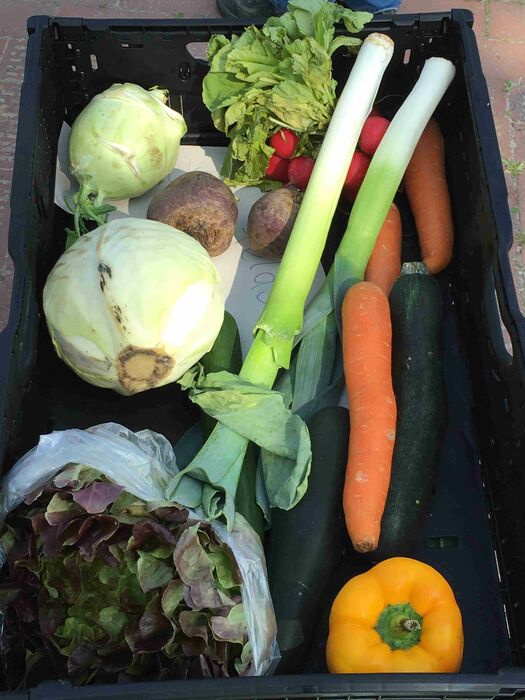From nature to the farm - from the farm to the table

The project "From nature to the farm - from the farm to the table", hereinafter referred to as the "farm project", has been successfully carried out over the past three years - in cooperation with the municipality of Ostercappeln and the Wittlager Landvolk and the Wittlager Landfrauen, supported by LB Damme and through the sponsorship of the Friedel & Gisela Bohnenkamp Foundation.
In 2018, Year 3 of the Grundschule am Wiehengebirge (Ostercappeln), Grundschule zur Schnippenburg (Schwagstorf) and the Mühlenbachschule (Venne Elementary School), each with two classes, and Year 5 of the Ludwig-Windhorst-Schule (Ostercappeln High School), each with 3 classes, visited four farms. This amounted to about 180 pupils per year, and about 550 pupils in the entire funding period.
The entire farm project was coordinated by Simone Egli-Kroll. The application and accounting was done by the municipality of Ostercappeln, contact person is Ellen Schewski.
The project consists of three parts. The first part is about the preparation for the farm visit in the school, carried out by Simone Egli-Kroll. The second part consists of the farm visit. This is accompanied by Olaf Böhmann and the farm managers. The third part is about "cooking", this part is planned and carried out by Kerstin Kampmann.
If the distance from the school to the farm is too far to walk, the children were allowed to drive back and forth in Mr. Rupp's covered wagon. The costs of the covered wagon trip were taken over by the municipality of Ostercappeln. The parents had to pay a food contribution of 3 Euros. The copying costs for the worksheets were also covered by the municipality of Ostercappeln. The fee costs could be financed by the project funding of the Bohnenkamp Foundation and the material costs could be paid by the donation of LB Damme.
In the fall of 2015, the farm project started with the elementary schools in Ostercappeln and Schwagstorf. Two classes each were visited in class to prepare for the project. The focus was on the basic introduction to the topic of farm animal husbandry, especially the dairy cow. By taking along milk products, the processing possibilities of milk were illustrated. The highlight for the children was making their own butter from cream. On the farm, the children learned how milking is done and what a cow eats and drinks in a day. Farm tours conveyed the varied work of the farm managers and their family. In order to establish a connection to their own nutrition, the products that the students had previously learned about on the farms were then prepared and eaten together in part 3 at school. The farms visited were Meyer zu Holte in Ostercappeln and Dürfahrt in Schwagstorf. These farms were also visited in fall 2016 and 2017.
In May 2016, the project was carried out in the high school. In three classes in year 5, the focus was again placed on farm animals in the run-up to the visit at school, especially on meat production. The visit to the calf farm Driehaus in Schwagstorf took place with a focus on calf rearing, but also with a station Christmas tree plantation. Cooking and eating was again done at the school. The students were eager to participate and happily ate everything that had been cooked together beforehand. The project also gives the students an insight into home economics.
The visits also took place in May 2017 and 2018. This year, it was noted that some of the students had already been to the dairy farms or visited the vegetable farm. The acquired background knowledge helped to understand the current topic even better.
In the early summer of 2016, 2017 and 2018, the topic was then vegetables. In the lessons at the elementary school in Venne, a whole basket of vegetables was presented and an attempt was made to divide the different vegetables into root, leaf and fruit vegetables. In addition, the food pyramid was once again referred to interactively. In order to convey to the students that vegetable cultivation is very labor-intensive, a small herb/vegetable box was created together in the school. Through their own organized care, the social aspect was strengthened among the students. During the visit to the Bünte vegetable farm, they planted, harvested or prepared the seedbed, depending on the weather conditions. In the first year, zucchini plants were potted and kohlrabi harvested. Kerstin Kampmann then cooked a vegetable soup with the students at the end, for example. The visits were all very successful and all participants would like the project to continue. All farm managers are willing to host students on their farms in the coming years as well. By organizing and conducting the farm visits externally, the project was well received by both teachers and farm managers. All involved can easily integrate the time commitment into their school and farm schedules.
The project's procedures are coherent and were well received by all involved. In order to emphasize the connection to local foods even more, in the future, part of the cooking ingredients will be purchased directly at the market in Ostercappeln and from the local butcher with the high school students before Part 3 cooking.
Through the visits of the students of the schools in the municipality of Ostercappeln to the four farms, an attempt is made to make clear the connection between the cultural landscape, farms as producers of food and the habitat of humans and animals. This has been successful over the past three years. The project will also be continued for another three years (2018 -2021) with the support of the Bohnenkamp Foundation.
(Report of the project manager, Ms. Egli-Kroll)